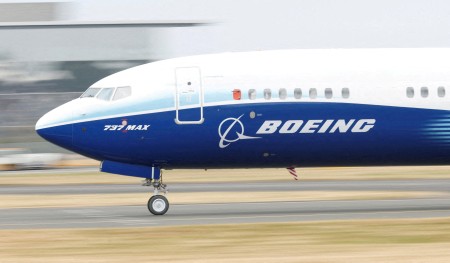By Joanna Plucinska and Allison Lampert
FARNBOROUGH, England (Reuters) – A plunge in Ryanair’s quarterly profits cast a shadow over the opening of the Farnborough Airshow on Monday, where aviation leaders were already fretting about supply chain snags, aircraft delays and floundering plans to cut emissions.
Boeing announced a bumper order from Korean Air for 20 777X jets and 20 787s, worth $7 billion according to estimated delivery prices from Cirium Ascend, in a boost for the U.S. planemaker’s long-delayed 777X programme.
But many delegates at the July 22-26 gathering of aviation leaders were not expecting the traditional deluge of deals as Airbus struggles to reach output goals and Boeing adopts a low-key posture amid its safety crisis, which was triggered by a panel flying off a 737 MAX jet in January.
Aviation was hit hard by the pandemic which saw air travel collapse only to bounce back sharply. That left many firms scrambling to resolve labour and parts shortages.
The situation has been exacerbated by a spiralling crisis at Boeing, which has had to slow production of its best-selling 737 MAX plane following the panel blowout.
Delays in delivering planes have hampered airlines’ efforts to capitalise on the post-pandemic surge in travel and inflated costs, and signs are growing they are struggling to pass those costs on to consumers as demand starts to normalise.
Ryanair, Europe’s biggest budget airline, reported on Monday an almost halving in quarterly profit, with fares plunging 15% and management warning of more pressure to come on prices.
CEO Michael O’Leary added there had been some improvement on deliveries from Boeing, but that there were still delays and he was getting a little concerned about deliveries due next year.
Separately, flydubai said its fleet expansion plans had been hit by delays in Boeing deliveries, while the boss of Air India said it was having to rob parts from other aircraft to keep its planes flying amid industry supply chain snags.
“The big question for the airlines here at Farnborough is what has happened to the halo effect of demand after the pandemic – has that recovery stalled?” said veteran aviation journalist Mark Pilling, who was due to host a panel of CEOs.
Pegasus Airlines CEO Guliz Ozturk told reporters customers were going “back to basics” seeking lower fares.
“We have started seeing the normalisation of demand. What does it mean? I mean, the demand is there, but now the travellers are looking for, as before the pandemic, for the most affordable, the lowest, the best price for their travel,” she said.
Ryanair’s warning on fares deepened worries about pressure on yields – a measure of average fare paid per mile by each passenger and a key barometer for airline profitability.
Airline shares were among the biggest fallers in Europe. Ryanair was down more than 14% and set for its worst day since June 2016 at 1140 GMT, while rival easyJet fell 8%, TUI was down 4.9% and BA-owner IAG lost 4%.
FIXING SUPPLY CHAINS
With dealmaking likely to be limited, the focus at the air show is likely to fall on how manufacturers are tackling supply chain blockages.
Stephanie Pope, Boeing’s new head of commercial aircraft, told a media briefing on Sunday that 737 MAX production was improving and the company was undergoing “transformational change” across safety and corporate culture.
Airbus CEO Guillaume Faury also said on Sunday it was making progress ramping up production of its top passenger jets.
Some deals will get over the line, delegates said. Virgin Atlantic is close to placing a top-up order for Airbus A330neos and Flynas, a Saudi low-cost carrier, is poised to order up to 30 of the same widebody aircraft, industry sources said.
Japan Airlines is expected to firm up recent tentative orders for jets and Boeing is seeing leasing interest for its 737 MAX, while Turkish Airlines is in the midst of negotiations to buy Boeing jets, industry sources said.
The companies declined to comment.
This week’s air show will be peppered with sustainability panels and workshops as aerospace giants and airlines seek to emphasise their commitment to reducing carbon emissions, even as they plan to massively expand global air travel.
On the defence side, the focus will be on Ukraine, possible delays to America’s future F-22 fighter replacement, code-named NGAD, and a defence review by Britain’s new Labour government.
Speaking at the show, British Prime Minister Keir Starmer said he wanted to put “on record” just how important the Global Combat Air Programme (GCAP) was, dampening speculation that the fighter jet project with Japan and Italy could be axed following the defence review.
(Additional reporting by Joe Brock, Tim Hepher and David Shepardson; Editing by Mark Potter and Josephine Mason)












